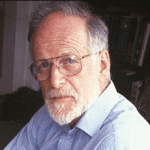
By Miles Goslett and Arthur Martin
Dr David Kelly was on a hitlist, says UN weapons expert as calls grow for full inquest
A leading UN weapons inspector last night added his voice to the growing clamour for a full inquest into the death of Dr David Kelly.
Dr Richard Spertzel claimed Dr Kelly was on a ‘hitlist’ in the final years of his life.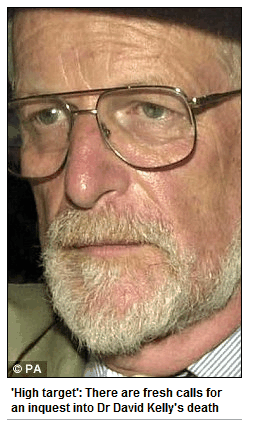
The former head of the UN Biological Section, who worked closely with Dr Kelly in Iraq in the 1990s, has written to Attorney General Dominic Grieve about the ‘mysterious circumstances’ surrounding the death.
The weapons inspector’s body was found after he was unmasked as the source of a damaging BBC news report questioning the grounds for the Iraq war.
Officially, he took his own life.
Yesterday Dr Spertzel told the Mail that the British authorities were ‘intentionally ignoring’ the issue.
He believes that there is something ‘fishy’ and insisted that a coroner should examine the death as soon as possible.
His demands come 24 hours after nine of Britain’s leading medical experts wrote an open letter to minsters demanding a full inquest.
Dr Spertzel said: ‘I know that David, as well as myself and a couple of others, were on an Iraqi hitlist. In late 1997, we were told by the Russian embassy in Baghdad. I had no idea what it meant but apparently David and I were high on the priority list.’
He said he and Dr Kelly were told that they were ‘numbers three and four’ on the list during an inspection trip in Iraq.
‘When it first happened I felt right away that David just being associated with the work he’d been doing
‘The Iraqi intelligence service did not take kindly to such action so my first reaction [to Dr Kelly’s death] was “we’d better watch our backs”.’
No inquest has ever been held into DrKelly’s death. Instead, a public inquiry chaired by Lord Hutton was set up to investigate the circumstances surrounding it.
The inquiry ruled that the 59-year-old committed suicide in woodland near his Oxfordshire home in July 2003 by cutting the ulnar artery in his wrist with a blunt pruning knife.
Dr Spertzel, who is based in Washington where he continues to write and lecture on biological weapons, said: ‘My concern about David Kelly’s death is exactly what the doctors are saying now – that is, it’s virtually impossible to commit suicide by slashing your wrist in that way.
‘It just doesn’t make sense. It seems to me that they [the British authorities] are intentionally ignoring all this. Something’s fishy.’
Yesterday some of the doctors who wrote to ministers demanded an end to the shroud of secrecy over the death.
They want the official post-mortem results to be made public and for witnesses to give evidence under oath.
Concern over the cause of death has been mounting after it emerged in January that all medical and scientific records, including the post-mortem report and photographs of the body, were secretly classified for 70 years in 2004.
Sir Barry Jackson, past president of the British Academy of Forensic Science and one of the doctors who wrote to ministers, said yesterday: ‘In my experience from 30 years as a practising surgeon I find it difficult to agree with the cause of death as listed on his death certificate.’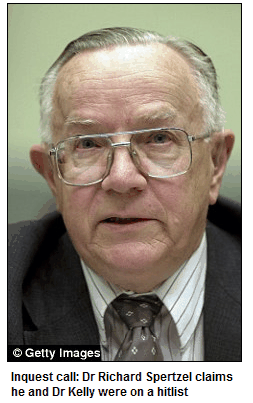
Another, Dr Elizabeth Driver, a solicitor and Fellow of the Royal College of Pathologists, added: ‘As a pathologist I cannot understand how Dr Kelly could have died from blood loss of a severed ulnar artery. It makes no medical sense. Little is known about the medical facts because the post-mortem has been kept secret.
‘There are obvious questions which were not addressed in the inquiry.’
Doubts over the official version of his death have previously been raised by Mai Pederson, a U.S. Air Force linguist who served in Iraq with Dr Kelly’s weapons inspection team.
She said he had a painful elbow injury which meant his hand was too weak to cut a steak.
He would have to have been a ‘contortionist’ to have killed himself in the way the Hutton Inquiry claimed, she said.
She also said he had a disorder that made it difficult to swallow pills, undermining Lord Hutton’s claims that he took some himself.
Dr Kelly investigation ‘was inadequate’: Now NINE top doctors demand inquest
By Miles Goslett
Nine of the country’s leading doctors today dramatically question the verdict that Dr David Kelly killed himself by slitting his wrist.
The eminent medical experts say it is unlikely the weapons inspector could have bled to death in the way the authorities claim – raising fresh doubts that it was suicide.
In an open letter to ministers, they also urge the Government to conduct a full coroner’s inquest to re-examine key medical evidence surrounding the case.
The move heaps huge new pressure on the Coalition to reopen the investigation. The doctors are experts in the fields of forensic science, intensive care and law, and include Sir Barry Jackson, past president of the British Academy of Forensic Science.
Eight of the nine have never expressed their opinion on the Kelly affair publicly before. Their intervention shows the continuing deep disquiet among senior medics about the way Dr Kelly’s death was investigated by the Hutton Inquiry – dubbed a ‘whitewash’ by critics.
They join a growing chorus of experts who have made their concerns public.
Officially, Dr Kelly, 59, took his own life in woodland near his Oxfordshire home in July 2003 by cutting the ulnar artery in his wrist with a blunt pruning knife.
But a female colleague who served with him in Iraq, Mai Pederson, says a hand and arm injury had left him ‘too weak’ to cut his own wrist. Witnesses say there was little blood at the scene.
And experts have doubts that he lost sufficient blood to cause his death.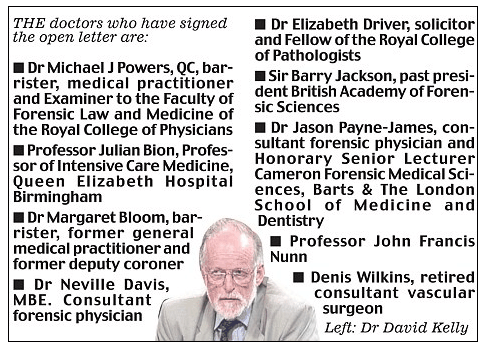
It also emerged after the Hutton Inquiry that no fingerprints were found on the knife Dr Kelly is alleged to have used, and that he was
It is backed by a second letter to Justice Secretary Kenneth Clarke, signed by Dr Michael Powers, QC. The letter questions the ‘adequacy of the investigation conducted by Lord Hutton’ and also calls on the Government to carry out an inquest.
The body of Dr Kelly was found shortly after he was exposed as the source of a BBC report questioning the grounds for war in Iraq. No coroner’s inquest has ever been held into his death. The only official verdict came from the Hutton Inquiry, a non-statutory public inquiry at which witnesses did not give evidence under oath.
Dr Powers told the Daily Mail: ‘The inquiry conducted by Lord Hutton into the cause of Dr Kelly’s death was inadequate and resulted in an implausible conclusion.
The opinions of the distinguished doctors in the letter to The Times are not given lightly. This reflects the widespread belief in the medical profession that his death was not due to haemorrhage.’
In January it emerged that Lord Hutton secretly classified all medical and scientific records relating to Dr Kelly – including the post-mortem examination report and photo of his body – for 70 years.
The likeliest way that a coroner’s inquest can go ahead is if Mr Clarke overturns the 70-year gagging order and allows another group of doctors – who have campaigned for access to the classified material as part of an ongoing legal action to force an inquest – to see it.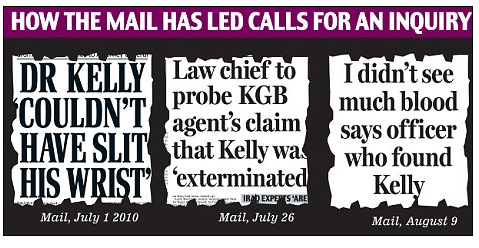
Mr Clarke is considering whether to grant them access. If he agrees, the doctors would be allowed to hand over this material to Attorney General Dominic Grieve. Under coroners’ law, Mr Grieve – who has expressed concern over the case – can apply to the High Court for an inquest if he believes there is considerable doubt in the public mind that Dr Kelly took his own life.
Mr Clarke and Mr Grieve met last month to discuss the case. It is understood they talked about scientific and medical reports relating to Dr Kelly including one thought to focus on his state of mind before his death.
Last weekend the detective who helped find his body, Graham Coe, gave an interview in which he revealed he lied about aspects of the evidence he gave to the Hutton inquiry.
Mr Coe, 63, now retired from Thames Valley Police, said there was very little blood at the scene. He also confirmed the disputed existence of a ‘third man’ with him and his partner DC Colin Shields that day.
Critics who believe Dr Kelly was murdered have claimed the suited figure mentioned in the accounts of volunteer searchers could have been from the security services.
At the Hutton inquiry Mr Coe said he had been accompanied by only one other officer – DC Shields – but he now says there had also been a trainee police officer with him, whom he refused to name.
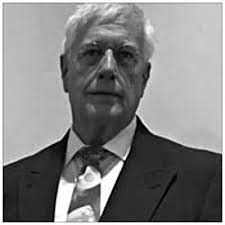
Gordon Duff posted articles on VT from 2008 to 2022. He is a Marine combat veteran of the Vietnam War. A disabled veteran, he worked on veterans and POW issues for decades.
Gordon is an accredited diplomat and is generally accepted as one of the top global intelligence specialists. He manages the world’s largest private intelligence organization and regularly consults with governments challenged by security issues.
Duff has traveled extensively, is published around the world, and is a regular guest on TV and radio in more than “several” countries. He is also a trained chef, wine enthusiast, avid motorcyclist, and gunsmith specializing in historical weapons and restoration. Business experience and interests are in energy and defense technology.
ATTENTION READERS
We See The World From All Sides and Want YOU To Be Fully InformedIn fact, intentional disinformation is a disgraceful scourge in media today. So to assuage any possible errant incorrect information posted herein, we strongly encourage you to seek corroboration from other non-VT sources before forming an educated opinion.
About VT - Policies & Disclosures - Comment Policy



